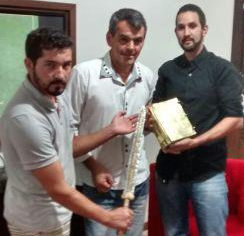
I was recently made aware of a group in Brazil who claim to have the sword of Laban, the original gold plates, and the Urim and Thummim and that a gentleman named Maurício is a modern day seer who used the ancient seer stones to translate the sealed portion of the Book of Mormon.
I’ve taken time to read over the said translation and believe it’s a hoax. It reads a little like the Mentinah Archives, but far less interesting. For the record I believe the Mentinah Archives are also a machination of the adversary. But, don’t take my word for it, you can find both online to review for yourself.
There is nothing in this 155 page translation that seems like some greater portion. It just reads like an embellished mish mash of disconnected ideas. Surely the sealed portion will be greater than the Book of Mormon we already have. This is absolutely not.
The unsealed Book of Mormon carries a spiritual power like none I’ve ever known. It is scripture. In my opinion this is not.